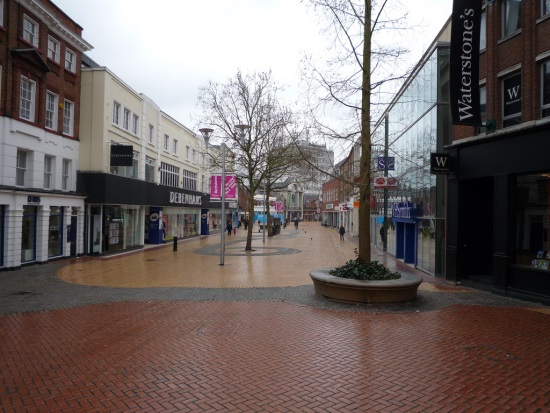A number of different methods have been put forward by experts in a bid to save the high street, with town centre redesigns and “activity days” common suggested solutions to a hugely complex solution. However, the British Retail Consortium, which represents a huge number of both online and high street stores, believes that the consistently growing cost of business rates is truly the root of the problem which is killing off independent stores nationwide.

A deserted Chelmsford High Street
In the past year, the BRC has campaigned tirelessly to freeze business rates, lobbying the government and pledging full support to retailers. Yet now it seems to have scrapped this plan entirely, as it believes its aim to push the government into a £1 billion cost saving plan was “unrealistic.”
While this may seem as if the BRC has backed down in the face of adversity, nothing could be further from the truth. In fact, it now believes the current business rates system is not fit for purpose and requires a radical overhaul to ensure small retailers are not left in impossible financial positions.
In an open letter to the retailers it represents, BRC director general Helen Dickinson outlined the organisation’s new aims.
The letter said; “After a series of discussions with members, stakeholders, ratings experts and HM Treasury, our main, medium-term objective is to secure solid commitments at a political and official level to reform business rates.
“We aim to achieve this by marshalling a range of arguments demonstrating that the current system is no longer fit for purpose, damaging to our high streets and town centres and that it inhibits the sector’s ability to invest, create jobs and drive growth.”
Although business rates increases are currently in line with inflation, the BRC believes that next year could see retailers hit with a rise of up to 3.3 per cent – adding an extra £300 million worth of pressure on the finances of high street traders. This is on top of the £500 million increase seen in the past three years alone.
In order to attempt to ward this off, the BRC has joined forces with the Confederation of British Industry in order to strengthen their own campaign into business rates. The CBI aims to force a cap of 2 per cent on future increases for business rates, effectively protecting retailers against fluctuations in inflation whilst simultaneously pacifying protestors within the government.
With the BRC planning to publish ideas regarding a shake-up of the business rates system early in 2014, Ms Dickinson is hopeful that the government will prove to be more “receptive to the idea of reform” than they are at the present time. Until then, retailers must simply hope that the next rise does not force even greater numbers to abandon the high street.
Do you think the business rates system is in urgent need of an upgrade, or would capping all rises at 2 per cent be sufficient until a longer-term solution could be found?
Previous Post
Food Inflation being Pushed Up by Fruit and Veg